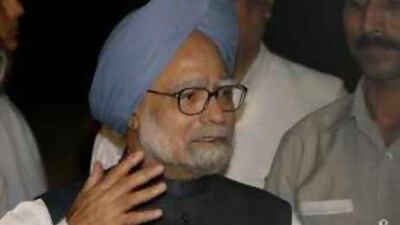NEW DELHI // Four years after the Congress-led United Progressive Alliance surged to power in 2004, the federal coalition's promises of alleviating poverty, boosting economic growth, eliminating corruption and reducing unemployment remain largely unfulfilled, political analysts say.
Its Common Minimum Programme (CMP), which Congress designed to get support from potential left-wing partners, also pledged to help farmers, provide clean drinking water and a guaranteed electricity supply to millions. But analysts and opposition leaders accused the government of neglecting these promises by allowing a controversial nuclear deal with the United States to take centre stage. "Part of the preoccupation with the nuclear deal has caused the CMP to fail," said Kamal Mitra Chenoy, a professor of comparative and Indian politics at Jawaharlal Nehru University in New Delhi. "If they had not focused too much on the nuclear deal, they could have focused more on problems at home, like water and electricity access. Electricity has been promised through the nuclear deal, but that's a long time away. Nuclear reactors are fabulously expensive and take a long time to construct."
The government's uneasy coalition with the left-wing parties collapsed two weeks ago when the Left withdrew support in protest against the India-US nuclear deal. The walkout forced yesterday's crunch vote of confidence in parliament, which the government narrowly survived. Prakash Karat, general secretary of the Communist Party of India (Maoist), the government's largest left-wing former coalition partner, said the nuclear pact was never part of the CMP.
He maintained the nuclear deal, which allows India to conduct civil nuclear commerce globally while still retaining its atomic weapons and not signing the nuclear Non-Proliferation Treaty, would give a "hegemonic" Washington too much leverage over Indian foreign policy. "When the UPA government was being installed in 2004, a Common Minimum Programme was drafted. When the Left was consulted, we had insisted on the deletion of a reference to 'strategic relations with the United States' ? But soon after, the government proceeded with forging a wider strategic alliance with the United States ? It does not make sense for India to bind itself to US strategic designs in Asia," Mr Karat said.
Government critics have berated the alliance for its disregard of developmental schemes for the "common man". While India has registered an annual average growth rate of eight per cent since 2004, among the world's highest growth rates, much of this new-found wealth has bypassed millions of Indians. One-third of India's population of more than 1.1 billion live in poverty - earning US$1 (Dh3.67) or less a day, according to the World Bank. About 400 million Indians still live without electricity.
But India has also emerged as the world's second-fastest producer of millionaires, lagging only slightly behind Singapore, a trend attributed by economists as largely caused by its economic growth, a robust stock market and rising property prices. The annual World Wealth Report published last year by Merrill Lynch, a global investment management company, and Capgemini, a financial consultancy, revealed that in 2006 India had 100,015 millionaires, up 20.5 per cent compared with 83,000 recorded the previous year. By contrast, the number of Singaporean millionaires grew by 21.2 per cent, only 0.7 per cent more than Indians, the report said.
Yet, India has also come under criticism for widespread corruption in the public sector. According to Transparency International, a global corruption watchdog, more than 22,000 homes across the country had paid about 8,830 million rupees (Dh760,000) in bribes last year for basic government services, including money paid to the police and school admission officials. But Satish Kumar, a former professor of diplomacy at Jawaharlal Nehru University and editor of India's National Security Review, said the criticism levelled at the government was unfair.
He pointed to its achievements: the National Rural Employment Guarantee Act, the world's largest state scheme to provide jobs that guarantees 100 days of work per family annually for tens of millions of Indians; the recent creation of hydroelectric projects to generate energy and provide water in western India; and the introduction in February of a farmers' debt relief package, worth 600 billion rupees.
India has been struggling to cope with rising farmer suicides in recent years. Overwhelmed by rising fertiliser costs, falling market prices, official corruption and persistent drought, thousands of poverty-stricken farmers have committed suicide. Official figures show 150,000 farmers killed themselves between 1997 and 2005 across the country. Western Maharashtra state, of which Mumbai, the financial capital, was among the worst hit.
"It's absolutely untrue to say the government has neglected the CMP because of the nuclear deal," Mr Kumar said. "After signing the nuclear deal the government has been working on everyday issues. The [rural employment act] has been working very well and is appreciated, as is the waiver of farm loans. Both schemes are part of the CMP and have brought relief to millions of needy Indians." No one from the Congress Party was available for comment.
@Email:rsisodia@thenational.ae

